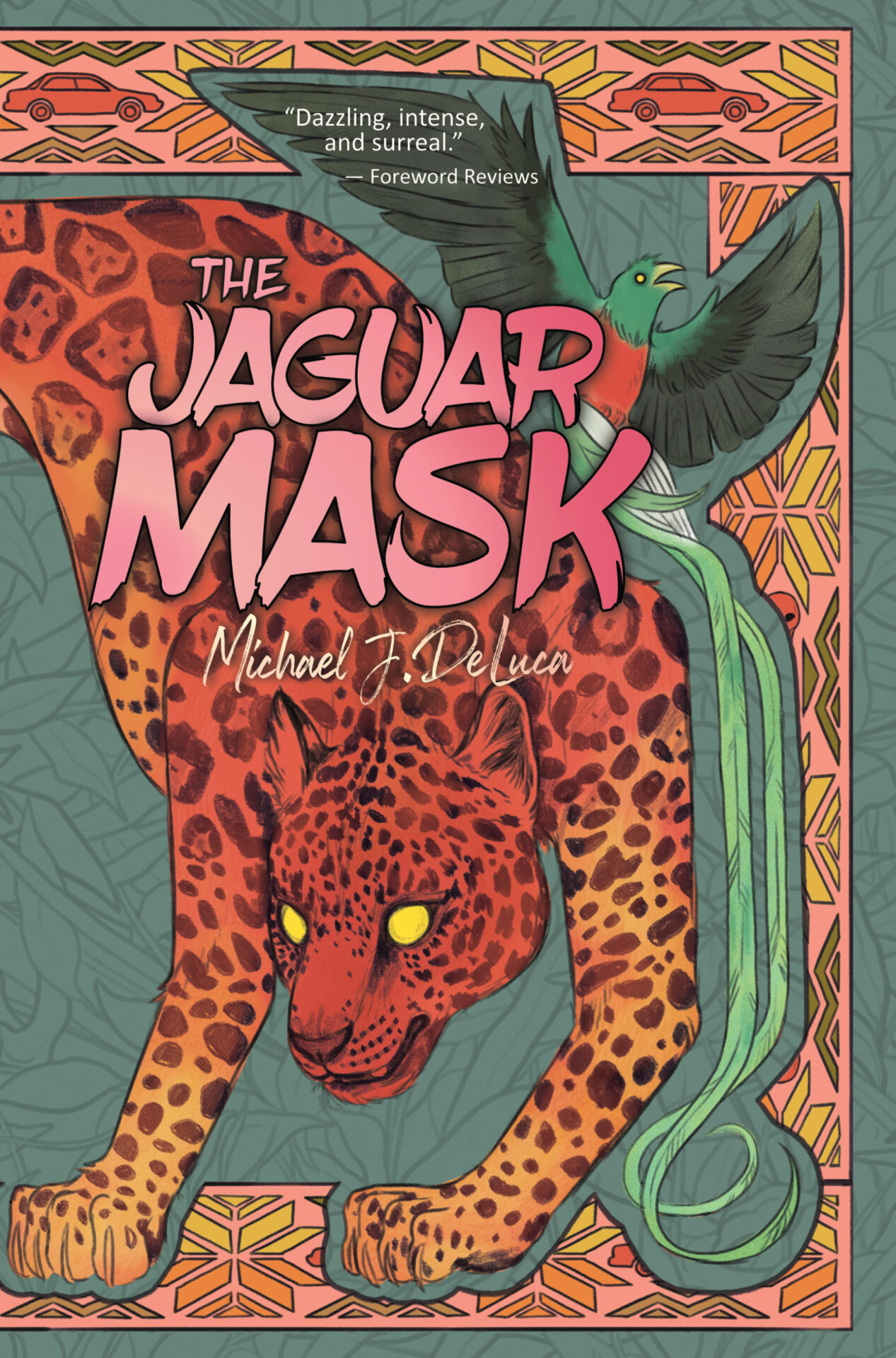
Michael J. DeLuca is joining us today to talk about his novel, The Jaguar Mask. Here’s the publisher’s description:
Felipe K’icab doesn’t know who he is. He only knows he was born different than his human family, and he can’t relax unless he’s blasting reggaeton in his cab weaving through the streets of Guatemala City. The jaguar mask and his other human faces keep him safe–until El Bufo, a corrupt ex-cop, commandeers his cab and drags Felipe into a murder conspiracy investigation, trying to expose the foreign-backed regime’s ecocidal and genocidal past.
Cristina Ramos knows who her mother’s killers are. After witnessing the murder in a vision, she struggles to keep her grieving family from falling apart. When El Bufo’s relentless vendetta throws Felipe into her life amid increasing civil unrest, Felipe and Cristina must overcome generations of institutionalized silence, uncover the secrets of their powers, and forge a path to justice, or else be swept away by another wave of violence.
What’s Michael’s favorite bit?

My favorite bit in THE JAGUAR MASK is the last 75 pages. Of those, it’s the very last page. I’m not going to spoil it, but I think I can communicate what gives me so much joy about it without having to.
It’s the part where the characters—a jaguar shapeshifter who hides behind ritual masks to pass as human and a visionary artist afraid to share her power because of what the truth can do—have finally overcome their inner inertia, they’ve been shoved out onto the stage in front of everybody and now they’re going to do what needs to be done.
This is a book about the masks coming off, the masks we all wear all the time when we go out into the world and onto the internet to interact with other people in different contexts, the masks that shield our soft, weird inner selves from the harshness of scrutiny being pulled off, peeled away, layer by layer, to reveal, finally, the faces we see in the mirror, the faces we see when we think of our inner selves, the selves we want and desire to be, capable of the things we dream about.
It’s a book about the difference between the regular, real person going about the routines of their lives (paralyzed by those routines, by social expectations and fear of the uncertainty and change that could potentially be wrought by violation of those expectations or changes to those routines), and a hero in a story (someone willing to do the right thing despite the risks, someone willing to stick their neck out). I am, for the most part, as I think most of us are, among the former. I’d like to think the older I get, the more settled I get in my privilege and my persistent and utter failure to conform to the societal expectations of normalcy around me, the closer I get to the latter. But it’s incredibly gradual by comparison.
THE JAGUAR MASK is my first novel. The novella I had out in 2020, NIGHT ROLL, is essentially about the same thing. What comforts have to be taken away, what threats have to roll in and loom over anyone’s settled, comfortable routine before they take arms against a sea of troubles? It’s a very old literary question–but one I think that constantly has to be answered anew. Surely that’s part of why people keep reviving Hamlet.
Putting a piece of writing out there for people to see is something I can no longer help understanding as an act of heroism. It’s a risk you take, exposing your inner self. I don’t know, probably plenty of writers aren’t exposing their inner selves with every book they write, but I couldn’t help it; I couldn’t make myself care enough about what I was writing without also investing myself in it, pouring in all my hopes for the world, my anxieties and dread and fury at injustice. That’s who the two main characters in THE JAGUAR MASK are: aspects of myself. I spent more than a decade writing this book, but those last 75 pages didn’t materialize until the very end of that grueling process. I couldn’t figure out how to write heroic people without first putting them through a crucible, a process by which I could convince myself they’d been made ready. That was what it took to make me believe in my own heroes.
And it worked. I believed in them. And the world and the possibilities for changing the world for the better opened up before them and before me, like magic.
I really needed that. And even before certain recent changes in the political landscape in the US made it so readily apparent, I was already fairly convinced we all needed it.
It’s an open ending, which is something I’ve always enjoyed. This time, I get to be the one responsible. I get to take my hopes and the characters’, push them right out onto the reader and then step back, close the curtain, and let people do with them as they will.
LINKS:
BIO:
Michael J. DeLuca’s novella Night Roll was a finalist for the Crawford Award in 2020. He is the publisher of Reckoning, a journal of creative writing on environmental justice. He also runs the indie ebook site Weightless Books, and his short fiction has been appearing since 2005 in places such as Beneath Ceaseless Skies, Apex, Mythic Delirium, Fusion Fragment, and Three-Lobed Burning Eye. He lives in suburbified post-industrial woodlands north of Detroit with partner, kid, cats, and microbes.
